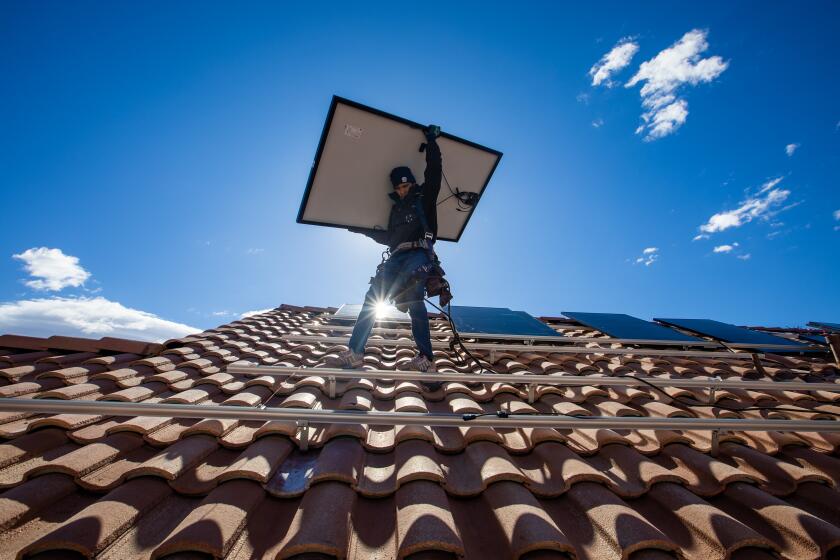Embattled Soledad cross will remain standing after 25-year legal battle
- Share via
More than 25 years of lawsuits, court rulings, aborted sales and property transfers over the landmark Mt. Soledad cross in La Jolla have finally come to an end, closing one of the longest legal battles over religious symbols on public property in the country.
On Wednesday the 9th U.S. Circuit Court of Appeals issued a one-page ruling ordering the end to the latest round of appeals and dismissal of the case, because the central issue — a religious symbol standing on government property — was moot.
That’s because in July 2015 the Mount Soledad Memorial Association agreed to purchase the cross and the land beneath it for $1.4 million from the Department of Defense. While that was seen as the beginning of the end, the plaintiffs in the suit who were seeking removal of the cross needed time to review the terms of the sale and work out other details.
It took more than a year for that to be worked out, lawyers for the Defense Department said in a motion filed Aug. 25. A settlement agreement resolves “all remaining issues, including attorneys fees, arising from the federal government’s acquisition, ownership and 2015 disposition of the Mt. Soledad Veterans Memorial,” they wrote.
The short motions and brief order from the court mark a muted end to a legal battle initiated in 1989, involving both the city of San Diego and then the federal government. The case traveled several times up and down the federal courts, including two trips to the U.S. Supreme Court.
The issue was always the same: Opponents said that the cross on public property violated the provisions in the state and federal constitutions prohibiting the government from endorsing one religion over another. Supporters countered that the cross had been a longstanding landmark and ultimately argued it was a secular sign of service and sacrifice by military veterans.
Courts consistently sided with opponents of the display. But that didn’t temper the passions of people on both sides of the issue as the case played out in what appeared to be an endless series of court hearing over the years.
“I think this now resolves the case,” said David Loy, the legal director for the American Civil Liberties Union of San Diego & Imperial Counties, which has long fought alongside other plaintiffs opposed to the presence of the cross.
“The government doesn’t own the cross or the land underneath it any more,” Loy said. “The government is no longer in the business of endorsing religion.”
The cross site, with a panoramic view of the city, was on land owned by the city of San Diego for decades. The city was the first defendant in the initial suit filed by Vietnam War veteran and atheist Philip K. Paulson in 1989.
U.S. District Judge Gordon Thompson ruled in 1991 that the cross, which is 29 feet tall and stands on a base that lifts it to a height of 43 feet, was unconstitutional and had to be moved off public land.
That triggered rounds of appeals and two attempts by the city to sell the property. Both were blocked by federal courts, which ruled that various terms of the sales violated the constitution because they gave a preference to buyers who planned to keep it as a religious symbol.
By 2006 the city was under pressure, facing the spectre of a daily $5,000 fine from the courts if it did not abide by the 1991 ruling ordering the cross off public land. At that time the U.S. Congress stepped in at the urging of local legislators and took the property by eminent domain, handing it to the Defense Department for use as a war memorial.
That move then triggered a second round of lawsuits, this time with the federal government as defendant. A group called Jewish War Veterans sued, as did veteran Steve Trunk, replacing Paulson after his death in 2006.
In 2008, cross supporters got a victory when U.S. District Judge Larry Burns in San Diego ruled that the cross was not a religious symbol, but one of service and sacrifice. That ruling was appealed, and in 2011 the 9th Circuit again ruled in favor of opponents, overturning Burns’ ruling and concluding the cross was a “distinctively Christian symbol” and could not remain on public land.
That ruling was under appeal when in 2015 the sale of the property to the private Mount Soledad Memorial Association went through. Lou Scanlon, president of the group, said Thursday that ending the case was welcome.
“It’s a pleasure to be able to operate without the cloud of litigation hovering over the monument,” he said.
Jim McElroy, the lawyer for Trunk who has been involved in the case for two decades, said the long battle was worth it.
“From our perspective, I think I can say that after 25 years we finally got the message through, that a 40-foot, 20-ton ubiquitous symbol of Christianity on public property is not constitutional,” he said.
A cross in some form had stood on the site since 1913 and had long been the site of sunrise Easter services since the 1950s. After the litigation began in 1989, the base of the cross was filled in with plaques commemorating services of veterans.
A condition of the sale to the association requires that the site be maintained as a “veterans memorial in perpetuity.”






